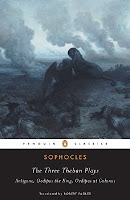This poem reminded me so very much of The Odyssey. It included a very similar style of delivery in that it was composed orally by yet another bard and later written down for our viewing pleasure. Of course, the story was also paralleling many aspects of the Odyssey. i believe the biggest and most obvious was the theme of the heroic figure. Beowulf turned out be yet another Odysseus-like figure, possessing super-human strength, giving him an ability to fight off things we can only speculate regarding their magnitude (fire-breathing dragon rings a bell). both Beowulf and Odysseus were famed and renowned throughout the lands for their valor, fighting spirit, and ability to persevere and traverse difficult situations. They were both father-figures for their respective reasons, leaving behind legacy and a feeling of awe to those younger than they.
I did not seem to view this book with a literary mindset. I simply proceeded to read through the epic poem, accepting demonic figure after demonic figure. I did not question exactly how Beowulf, as an old man, was able to literally break a sword against the dragon. These cinema-worthy actions simply breezed by as if I were watching a Michael Bay film. I failed to realize significant literary elements. However, I attempted to pick up on a few, one of which is the varied role of the gods. A large difference between Beowulf and the Odyssey was the role of gods in the poems. Beowulf did not hesitate to include and reference god throughout the story, however, we did not see or hear of any actual gods interacting with humans. God appeared to be more of a constant force, pushing the sails of the (figurative) boat in whatever direction he/she saw fit. God was often mentioned for creating the fates of the many characters, all presented with simple assumption.
I questioned Beowulf’s motives for travelling in search of various monsters to kill off. Was it really as simple as seeking materialistic rewards such as gold and armor? I doubt it. I believe that Beowulf based his life around the desire to prove himself. As stated early in the poem, Beowulf challenged his friend to swim days on end in the ocean to see who would be successful. This is one of the many actions taken by the famed warrior in seeking to prove himself. I believe that the poem itself is Beowulf’s attempts at pushing and proving his own courage, his own valor, his own ability.


